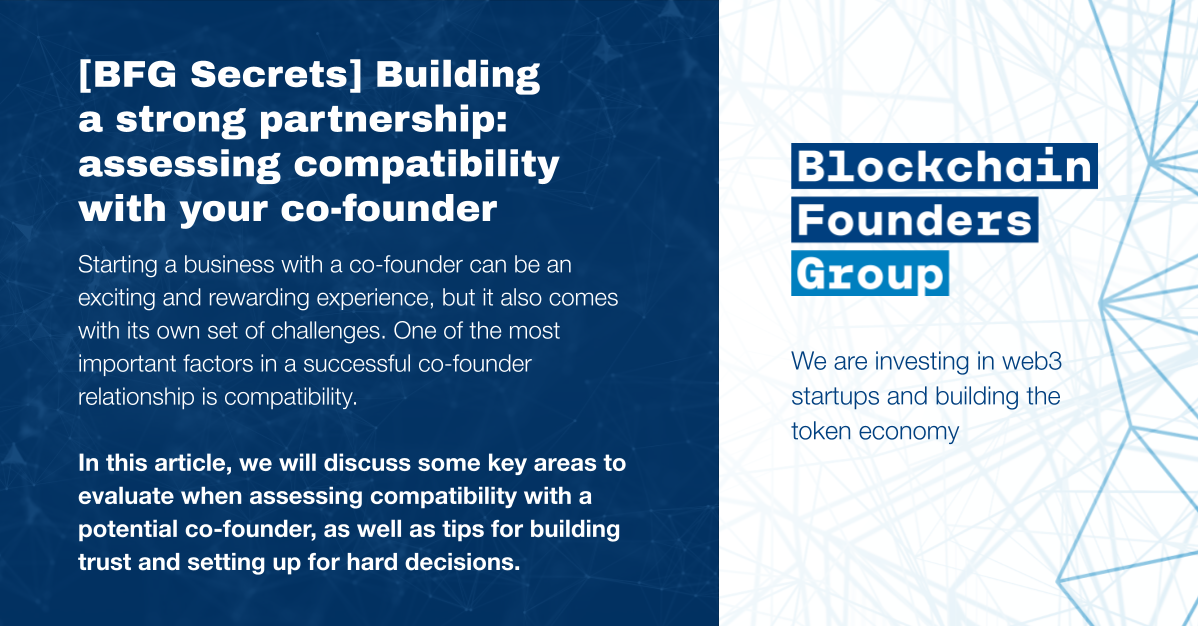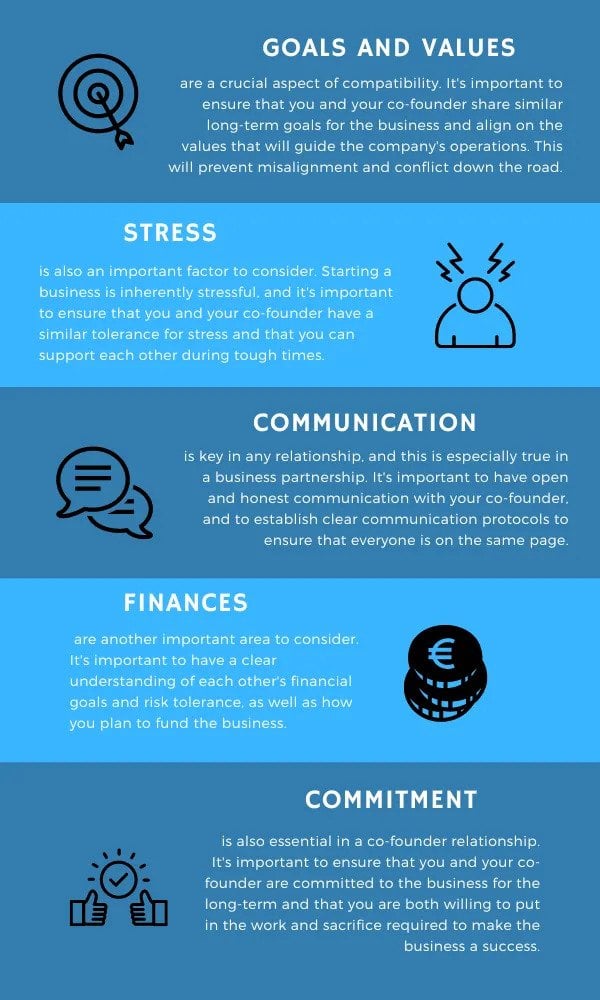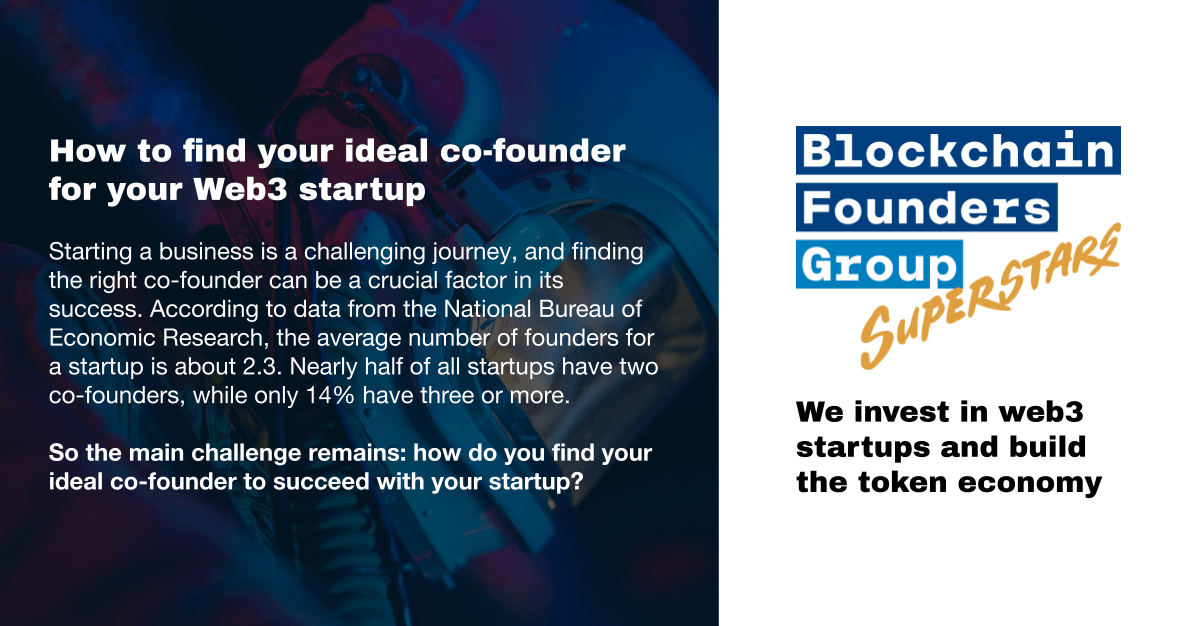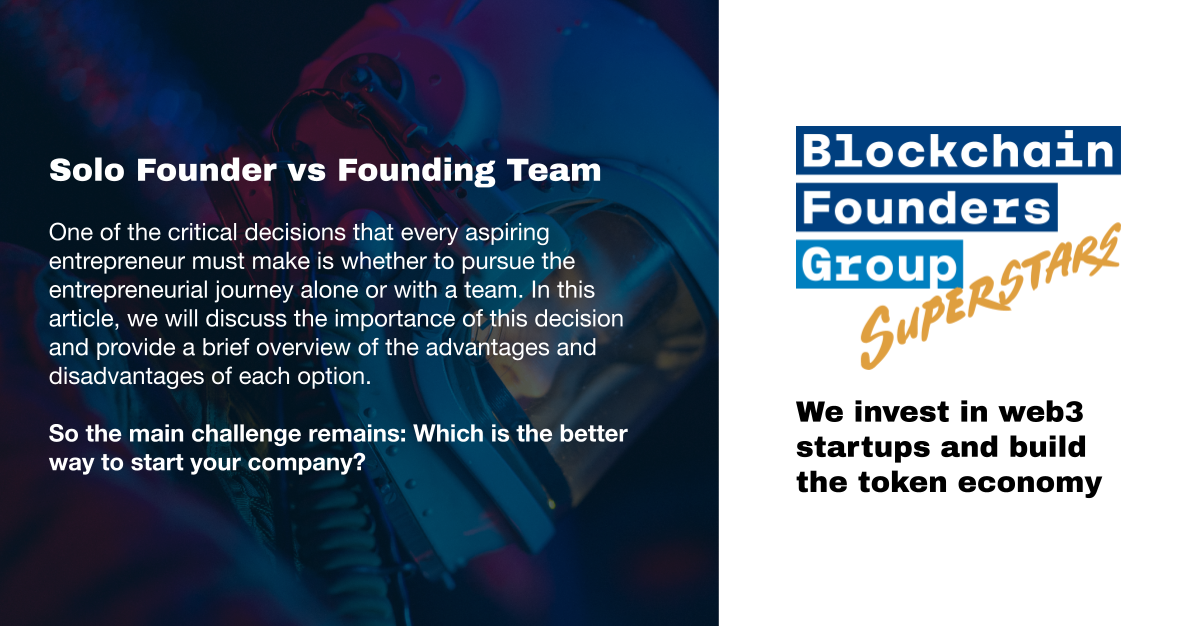Building a Strong Partnership: Assessing Compatibility With Your Co-Founder

Starting a business with a co-founder can be an exciting and rewarding experience, but it also comes with its own set of challenges. One of the most important factors in a successful co-founder relationship is compatibility. In this article, we will discuss some key areas to evaluate when assessing compatibility with a potential co-founder, as well as tips for building trust and setting up for hard decisions. - Author: Sarah Gottwald.
|
Table of Contents |
|
1. Co-founder compatibility |
I. Co-founder compatibility

Furthermore, when assessing compatibility with a potential co-founder, it’s important to discuss topics such as how much to work on the startup, what “being available” and “response times” look like, and how long you can go without salary or benefits. It’s also important to establish milestones that need to be reached in order to ensure that everyone is on the same page.
Every person has different needs, experiences and expectations. However, it happens quickly that one’s own ideas are considered “normal” and are automatically expected by other people. These disappointed expectations can quickly lead to disputes and accusations, and even to the breakup of the company. Clear communication at this point can be worth a lot of money. It is important that the results are recorded in writing and that both parties can agree on them.
II. How to split equity
I have often seen that the shares in a company are divided differently. When it comes to splitting equity unequally, there are a number of bad reasons to do so. These include “I came up with the idea,” “I started working on the idea 6 months before my co-founder,” “My co-founder took a salary for a while and I didn’t,” “I am older and more experienced than my co-founder,” and some more.
What is often forgotten at this point is that if a start-up is successful, the partnership will last for many years. Even if one of the persons has contributed more at the very beginning, one should carefully consider whether it is sensible to take have these differences in power and motivations in the long term.
III. Hard decisions and trust
To set up hard decisions, it is essential to establish a clear chain of command and decision-making authority. This can be accomplished by designating a CEO or assigning specific titles to individuals within the start-up. Additionally, it is important to clearly define areas of responsibility and ownership, so that all members of the team understand their roles and how they contribute to the decision-making process. To ensure that disagreements are handled effectively, it is also important to establish guidelines for handling both minor and major conflicts. This can include creating a structure for accountability so that individuals are held responsible for their actions and decisions. All team members need to have a clear understanding of the company’s values and goals so that they can align their actions and decisions with the overall vision of the organization.
Building trust is essential in a co-founder relationship. This can be achieved by trusting people by default, following through on commitments and spending time together in person.
IV. How to handle mistakes
Create space for mistakes and encourage experimentation to learn and grow, because it can be the key to their long-term success.
- Innovation and risk-taking: Startups are often characterized by their willingness to take risks and try new things. This means that mistakes are inevitable, and if the fear of making mistakes is too great, it can stifle innovation and creativity.
- Learning opportunities: Mistakes are a natural part of the learning process. By allowing room for mistakes, startups can learn from their failures and adjust their approach accordingly. This can help them to improve their products, processes and business models over time.
- Building resilience: Mistakes and failures can be difficult to handle, but they also provide an opportunity to build resilience. By learning how to recover from mistakes, startups can become more adaptable and better equipped to handle future challenges.
- Building a culture of experimentation: Startups often have to experiment with new ideas and business models to find what works. A culture that values experimentation and accepts that mistakes happen is essential for this process.
V. Personal relationship
To ensure a successful co-founder relationship, it’s also important to establish useful habits and structures. This can include:

VI. Personality and communication styles
When working closely with a co-founder, understanding each other’s personalities and communication styles is crucial for maintaining a healthy and productive working relationship. This includes being mindful of each other’s mental health and recognizing how stress can affect different people in different ways.
It’s important to know how your co-founder reacts when under pressure. Do they tend to attack or retreat? Understanding these tendencies can help you to communicate more effectively and provide support when needed. Additionally, it is important to know whether your co-founder is comfortable speaking up when they see a problem, or if they prefer to keep their concerns to themselves.
Creating an environment where your co-founder feels comfortable expressing their concerns is also important. It’s vital to establish a culture where open communication is encouraged and valued. It is also important to celebrate and praise each other’s wins and achievements, to build a positive and supportive work atmosphere. And finally, it’s essential to make sure that you both feel comfortable making suggestions or constructive criticism about each other’s work without feeling attacked.
By understanding each other’s personalities and communication styles, you can build a strong and resilient partnership that can weather any challenge that comes your way.
Conclusion
In conclusion, co-founder compatibility is crucial for the success of a business. By evaluating compatibility in key areas such as goals and values, stress, communication, finances, and commitment, you can ensure that you and your co-founder are on the same page.

About Blockchain Founders Group
Blockchain Founders Group (BFG) is the driving force behind web3 innovation. As a company builder, we bring together a team of blockchain visionaries, experienced entrepreneurs, and industry experts, all committed to nurturing emerging talent. Our BFG acceleration programs serve as your springboard for launching blockchain startups, transforming concepts into reality in just 2-3 months. Each cohort develops 5-8 unique web3 ideas, and selected projects will be financially supported with 70,000 - 100,000 EUR, along with access to our extensive network. Join us in shaping the future of web3!
Stay updated by connecting with us on LinkedIn, Medium, Twitter, and YouTube.
Contact: Max Zheng, Director of Investments, max.zheng@blockchain-founders.io
Subscribe by email
Share this
You May Also Like
These Related Stories

How to Find Your Ideal Co-Founder For Your Web3 Startup

Solo Founder vs Founding Team - Which is better to start with?
.jpg?width=1198&height=626&name=BFG%20_%20Corporate%20Identity%20_%20LinkedIn%20Optimized%20-%20link%20r%20(1).jpg)

No Comments Yet
Let us know what you think